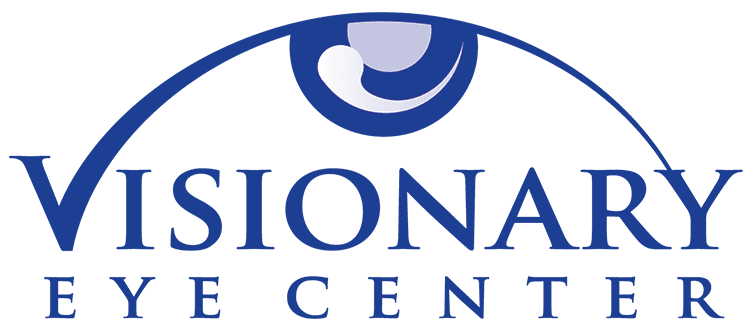SHOP DRY EYE CARE TODAY!
Use code VISIONARYEYE20 at checkout for 20% off!
In this age of rapid technological advancement, the issue of health is usually brought into the equation with it. These days almost every child, teen, and adult has a number of phones, tablets, and laptops to choose from on any given day. The exponential increase in screen time has led to concerns about light emission from these screens and the health implications they have on the user, specifically blue light.
One of the most popular ways of combating this issue is glasses that block blue light from the user’s eyes. However, recent evidence suggests that blue light may not be the culprit to eye issues and digital eye strain (DES), and the truth about blue light glasses is slowly being revealed.

While it may not be extremely crucial that you understand everything about blue light, it is helpful to have a little background information on the subject. Blue light is found naturally through sunlight, and it is also present in general lighting and electronic displays. Sunlight emits 100,000 lux while general lighting only emits approximately 50-70 lux, so a long day in the sun with no protection can be much more harmful than a couple hours on your phone. On the light spectrum, blue light is almost indistinguishable to the invisible ultraviolet rays which is one of the reasons why there are mixed findings about the effects of blue light.
Blue light can be helpful or harmful depending on the where, what and how of the situation. For example—because blue light suppresses melatonin in your body—prolonged use of your phone, especially before bed, can cause difficulty sleeping and disrupt your circadian rhythm. But, if you were to take a walk during your break from your job, the sunlight can make you come back feeling alert and awake.

Blue light glasses have specially crafted lenses that block or filter out blue light. They are available both with and without a prescription. The manufacturers claim they protect from glare and can help reduce damage to your eyes from prolonged exposure to blue light.
According to this study, 40-60% of people experience eye symptoms from prolonged use of electronic displays. These symptoms have been coined as digital eye strain (DES) including eye fatigue, ocular irritation, burning, eye strain, redness, dryness, blurred and double vision.
It had long been speculated that blue light was the main cause of DES, and to combat the issues there was a huge marketing push for blue light glasses. They were received well by the public because technology is now so ingrained in our society. Advertised benefits of the glasses include less eye strain, improved sleeping and prevention of eye disease. But is this the full truth about blue light glasses?
According to this same study, there is minimal evidence to support the theory of blue light causing DES symptoms and blue light lenses as a clinical treatment for DES. However, they have been proven to reduce symptoms for certain people, so keep using them if they make you feel better.
"Two studies from our laboratory do not support the proposal that DES symptoms are associated with exposure to visible blue light. In the first investigation, we compared symptoms after sustained reading from a tablet computer.26 The screen was covered either with a filter that blocked more than 99% of blue light or an equiluminant, neutral-density filter (Figure 1). We observed no significant difference in post-task symptoms between the two conditions (Figure 2). The study does have some limitations, as it was not performed on a double-blind basis, and most commercially available filters only block between 10% and 20% of blue light, rather than the 99% level tested here.27 " (excerpt from https://www.reviewofoptometry.com/article/living-with-blue-light-exposure)
Moreover, these findings have shown that there are a plethora of factors that contribute to DES. It is important to manage other elements that can have a more collectively positive effect such as optimal environment for screen viewing, proximity to the screen, amount of time and when.
Here at Visionary Eye Center, we understand the importance of information. An educated patient can make the best decisions for themselves or families, and we are here to help every step of the way. Our site is filled with information. Also, be sure to check out our Facebook and Instagram for our latest tips. We look forward to meeting you! Contact us today.
 775.587.3892info@visionaryeyecenter.com8175 South Virginia Street Suite B-900
775.587.3892info@visionaryeyecenter.com8175 South Virginia Street Suite B-900